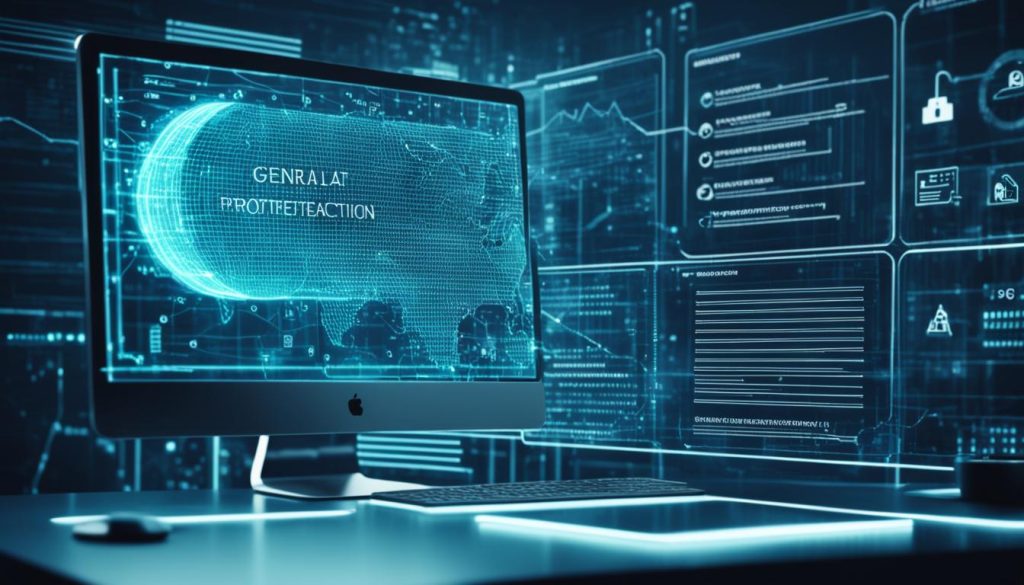Adverts
Did you know that Brazil is one of the countries most affected by cyber attacks? According to research, the country recorded more than 1.6 billion attacks in just one year, putting the security of personal and business data at risk. Given this alarming scenario, it is essential to invest in cybersecurity to protect your information and ensure the digital security in the country.
Main points of this article on Cybersecurity in Brazil:
- A importance of cybersecurity in Brazil
- Measures of data protection at Neoenergia
- The relationship between the General Law of Data Protection (GDPR) and the cybersecurity
- Challenges in data governance
- The importance of collaboration between law and cybersecurity
The Importance of Cybersecurity in Brazil
A cybersecurity It is especially important in Brazil, where the number of cyber attacks has increased. According to research, the proportion of internet users in the country has been growing, which increases exposure to risks. Furthermore, the Covid-19 pandemic has further boosted the use of technology and the internet, making the digital security an even more relevant concern.
Adverts
The implementation of cybersecurity programs and public awareness of the risks are essential to protect personal data and avoid security incidents.
| Advantages of Cybersecurity in Brazil | Protection Measures |
|---|---|
| Greater security of personal data | Use of updated firewalls and antivirus |
| Preventing fraud and cybercrime | User training on security best practices |
| Improvement in the country's image on the world stage | Constant system monitoring and intrusion detection |
A notable example is Neoenergia, which has a Corporate Cybersecurity area dedicated to protecting the company's and its employees' data. The company carries out cybersecurity awareness events and campaigns, in addition to implementing measures such as remote access with two-factor authentication. Neoenergia is monitored by Bitsight, a security rating company, and is considered a safe company.
Adverts
A digital security It is a challenge that needs to be faced vigorously in Brazil. The implementation of cybersecurity policies, along with risk awareness, are essential to protect data and ensure security. digital security in the country.
Cybersecurity at Neoenergia
The Neoenergia Group is a company that values data security and the protection of its employees. Therefore, it has a Corporate Cybersecurity area dedicated to ensuring the company's cybersecurity. Working together with the Director of Corporative security, this area aims to create a cybersecurity culture, maintain the regulatory structure, support business areas, protect personal data and identify and mitigate risks.
Neoenergia develops events and awareness campaigns about cybersecurity, seeking to inform and engage its employees in the importance of data protection. Additionally, it implements security measures such as remote access with two-factor authentication, which ensure that only authorized people can access sensitive company information.
To reinforce its position as a safe company, Neoenergia is monitored by Bitsight, a security rating company. This partnership helps the company identify areas that can be improved in terms of cybersecurity, providing a safer environment for employees and customers.
See too:

Neoenergia reinforces its commitment to cybersecurity, adopting best practices to protect the company's data and guarantee the safety of its employees. These measures are essential to face the challenges of the digital world and to maintain the trust of customers and stakeholders.
General Data Protection and Cybersecurity Law
The General Data Protection Law (GDPR) is Brazilian legislation that regulates the processing of personal data and has a direct link with cybersecurity. This law establishes rights and obligations related to data protection, including the subject's consent, the adoption of security measures and the reporting of security incidents.
The implementation of cybersecurity programs is essential to comply with the requirements of GDPR and protect the personal data of companies and individuals. By adopting appropriate security measures, organizations can ensure the confidentiality, integrity and availability of data, avoiding privacy breaches and security issues.
The LGPD provides that companies must implement technical and organizational measures to ensure the security of personal data, such as the use of encryption, making backups, training employees and implementing information security policies. Furthermore, the law also establishes that organizations must appoint a data protection officer, responsible for ensuring compliance with data protection standards.
The relationship between LGPD and cybersecurity highlights the importance of a comprehensive approach to protecting personal data. Compliance with the LGPD is not just about implementing security measures, but also requires actions such as risk analysis, carrying out audits and defining internal policies and processes.
Main points of the LGPD related to cybersecurity:
- Consent of the holder: The collection and processing of personal data must be carried out with the consent of the holder, who must be informed in a clear and understandable way.
- Security measures: Organizations must adopt technical and organizational measures to protect personal data, such as encryption, access control and information security policies.
- Incident reporting: Companies must report security incidents that may affect personal data within a reasonable time and, when necessary, inform data subjects about what happened.
- Data protection officer: Organizations must appoint a data protection officer, responsible for ensuring compliance with data protection standards and acting as a point of contact with data subjects and the National Data Protection Authority (ANPD).
Compliance with the LGPD and the adoption of cybersecurity measures are essential to protect personal data and ensure compliance with data protection laws. By investing in information security and adopting good cybersecurity practices, companies can build customer trust, avoid penalties and promote a safer digital environment.

Challenges in Data Governance
A data governance plays a key role in protecting and managing information for organizations. In the context of cybersecurity, the data governance faces several challenges that require effective and comprehensive solutions.
One of the challenges is the lack of defined and documented treatment processes. Companies often do not have clear guidelines for handling data, resulting in inconsistent practices that can compromise security.
Another challenge is related to application security. Companies often develop systems without due programming care, leaving gaps for potential vulnerabilities that can be exploited by cyber criminals.
The dynamic nature of cyberattacks is also a significant challenge. Criminals are constantly updating their techniques and strategies, requiring cybersecurity programs to be regularly updated to face ever-evolving threats.
Furthermore, it is essential that there is continuous training of employees to ensure the security of personal data. People are often the weakest link in the security chain, being targets of phishing and other types of attacks. Therefore, it is essential to raise awareness and educate employees about best security practices.
To face these challenges, it is necessary to implement clear data governance policies, defining responsibilities and guidelines for protecting information. Furthermore, it is essential to invest in advanced security technologies, carry out regular intrusion tests and have teams specialized in cybersecurity.
Main challenges in data governance:
- Lack of defined and documented treatment processes
- Lack of security in applications developed without adequate programming care
- Dynamicity of cyber attacks
- Need for ongoing employee training
Addressing these challenges is fundamental to ensuring the security of personal data and strengthening data governance in organizations.

| Challenges in Data Governance | Solutions |
|---|---|
| Lack of defined and documented treatment processes | Define clear data governance policies and create guidelines for securely handling information |
| Lack of security in applications developed without adequate programming care | Invest in advanced security technologies and perform regular penetration testing to identify vulnerabilities |
| Dynamicity of cyber attacks | Regularly update cybersecurity programs and stay informed about new threats |
| Need for ongoing employee training | Raise awareness among employees about best security practices and conduct regular training |
The Importance of Collaboration between Law and Cybersecurity
Collaboration between legal professionals and cybersecurity experts is critical to the effective implementation of data governance programs. Cybersecurity is a continuous and multidisciplinary process, which requires a technical, legal and information security approach. Documentation of the evaluations and tests carried out, as well as knowledge and joint work, guarantee compliance with data protection legislation and risk mitigation. Synergy between professionals from different areas is essential to guarantee the security of personal data.
Law and Cybersecurity: A Strategic Partnership
Collaboration between law and cybersecurity is key to ensuring personal data protection and the legal security. By combining legal and technical knowledge, professionals can develop effective data governance policies and practices, respecting current legislation and information security principles.
By working together, legal professionals and cybersecurity experts can analyze existing threats and vulnerabilities, identify risks, and implement appropriate protective measures. Through this collaboration, it is possible to establish secure data processing processes, define information access and sharing policies, and carry out regular assessments to ensure compliance with data protection laws.
A Comprehensive Perspective on Data Security
A collaboration between law and cybersecurity allows you to create a comprehensive perspective on data security. While legal professionals ensure compliance with laws and regulations, cybersecurity experts provide technical expertise to identify and mitigate risks associated with information security.
This multidisciplinary approach allows companies and organizations to gain an in-depth understanding of data protection laws and cybersecurity best practices. Furthermore, it guarantees the legal security, as the implemented policies and procedures comply with legal requirements.
A collaboration between law and cybersecurity is fundamental to ensuring the security of personal data and compliance with data protection laws. By combining legal and technical knowledge, it is possible to develop effective data governance policies and mitigate the risks associated with information security.

A personal data protection and the legal security are essential aspects in the digital world. Collaboration between law and cybersecurity plays a fundamental role in ensuring data protection and privacy, as well as compliance with data protection legislation. It is through collaboration and working together that cybersecurity is strengthened and the security of personal data is effectively protected.
Data Protection and Privacy in Cyberspace
Cyberspace presents unique challenges for data protection and user privacy. With rapid technological evolution and global interconnection, risk exposure and information vulnerability increase significantly. In this context, legislation aimed at personal data protection, such as the General Data Protection Law (LGPD), play a fundamental role in defining rights and obligations in the digital environment.
Cybersecurity plays a central role in protecting data and preserving privacy in cyberspace. Implementing robust security measures, such as data encryption and two-factor authentication, helps mitigate the risks of unauthorized access. Furthermore, increasing user awareness of best practices digital security is essential to ensure the protection of personal data.
A online privacy it is also a crucial aspect to consider in cyberspace. Users must have control over the information they share and be aware of the privacy policies of the digital platforms they use. It is important to read the terms of use and understand how data is collected, stored and shared by companies.
Implementing effective data protection policies and practices can help build trust with users and ensure that their personal information is handled appropriately. Furthermore, companies must carry out regular audits to verify compliance with data protection legislation and ensure information security.
A data protection in cyberspace and the preservation of online privacy These are ongoing challenges that require joint efforts from governments, companies and users. Collaboration and investment in digital security are fundamental to ensuring the reliability and integrity of the online environment.
The role of LGPD in data protection in cyberspace:
The General Data Protection Law (LGPD) is Brazilian legislation that establishes guidelines for the processing of personal data. It aims to guarantee user privacy and ensure that their information is used safely and legally. The LGPD imposes obligations on companies, such as obtaining users' consent to process their data, providing transparency about the use of information, and implementing appropriate security measures to protect personal data.
The LGPD also grants users rights, such as access to their data, correction of inaccurate information and the right to delete data when it is no longer necessary for the purpose for which it was agreed. It is essential that companies comply with the LGPD and protect user data, ensuring respect for their privacy in cyberspace.
| Main challenges in data protection and privacy in cyberspace | Data protection and privacy strategies |
|---|---|
|
|
The Evolution of Law in the Digital World
Digital Law is a legal area in constant evolution, which seeks to regulate social interactions carried out in electronic media. With digital transformation and the growing importance of personal data, Law needed to reinvent itself to guarantee the legal security in cyberspace. The creation of legislation such as the LGPD and GDPR reflects the need to protect the fundamental rights of individuals in the digital context.
The evolution of Law in the digital world is essential to keep up with technological changes and ensure adequate protection of personal data and the legal security in cyberspace.
Collaboration between professionals from different areas, such as law and cybersecurity, is essential to face challenges and find appropriate solutions for the digital world. Interdisciplinarity is essential to understand the legal nuances involved in data protection, as well as best cybersecurity practices. The evolution of Law in the digital world aims to guarantee the protection of individuals and the balance between technological innovation and the preservation of fundamental rights.
The Role of Data Protection Legislations
The creation of data protection legislation, such as the LGPD in Brazil and the GDPR in the European Union, marks a significant advance in the search for legal security in cyberspace. These laws establish clear guidelines for the processing of personal data, requiring user consent, adequate security measures and the notification of security incidents. Furthermore, legislation seeks to ensure that individuals have control over their personal information and are protected from abuse.
The Importance of Working Together
The evolution of Law in the digital world requires joint action between legal professionals and cybersecurity experts. This collaboration is essential to understand the technical and legal aspects involved in protecting data and combating cyber attacks. The synergy between these areas allows the development of effective strategies for preventing and responding to security incidents, ensuring legal security in cyberspace.
Challenges and Opportunities
The evolution of Law in the digital world brings with it challenges and opportunities. Rapid technological transformation requires constant updating of laws and adaptation to new realities. Furthermore, international collaboration is essential to ensure the harmonization of legislation, promoting legal certainty around the world. The evolution of Law in the digital world also creates opportunities for the development of innovative solutions and the protection of individuals' fundamental rights.
The evolution of Law in the digital world is essential to guarantee legal security in cyberspace. With the growing importance of personal data and the increase in cyber attacks, it is essential that laws keep up with technological changes and protect users' rights. Collaboration between legal and cybersecurity professionals is essential to face challenges and find appropriate solutions for the digital world. The evolution of Law in the digital world reflects the commitment to protecting fundamental rights in the digital context and ensuring legal security in cyberspace.
Conclusion
Cybersecurity is essential to protect personal data and ensure the digital security in Brazil. The increase in cyber attacks and growing exposure to risks highlight the need to implement cybersecurity programs and raise awareness of best protection practices. Collaboration between legal professionals and cybersecurity experts is essential to ensure compliance with data protection legislation and legal security in cyberspace.
The evolution of Law in the digital world reflects the need to adapt laws to new realities and guarantee the protection of fundamental rights in the digital context. Cybersecurity is a continuous process that must be treated seriously, aiming to protect personal data and guarantee the privacy of users in cyberspace.
The implementation of cybersecurity practices is of fundamental importance for the success of companies and the preservation of digital society. It is necessary to always be up to date on the latest data protection techniques and invest in advanced technological solutions to combat cyber attacks. Cybersecurity is a crucial topic and requires a joint effort from professionals from different areas to ensure data protection and information security in Brazil.
FAQ
What is cybersecurity?
Cybersecurity is a set of practices that protects information against loss of confidentiality, integrity or availability.
What are the objectives of cybersecurity?
The objectives of cybersecurity are to create a culture of security, protect personal data, identify and mitigate risks.
How can I protect my personal data?
Some security tips include using antivirus, keeping systems up to date, being careful when opening unknown content and avoiding providing personal information under suspicious conditions.
Why is cybersecurity important in Brazil?
In Brazil, the number of cyber attacks has increased, and exposure to risks has also increased with the growth in the use of the internet and technology, especially during the Covid-19 pandemic.
What is the General Data Protection Law?
The General Data Protection Law (LGPD) is Brazilian legislation that regulates the processing of personal data and has a direct connection with cybersecurity.
What are the challenges in data governance?
Challenges in data governance include the lack of defined and documented processing processes, the lack of security in applications developed without adequate programming care and the need for regular testing to identify vulnerabilities.
How important is collaboration between law and cybersecurity?
Collaboration between legal professionals and cybersecurity experts is essential to implement effective data governance programs, ensuring legal security in cyberspace.
How to protect data and privacy in cyberspace?
Cybersecurity and user awareness are essential to protect data and preserve privacy in cyberspace, along with the implementation of legislation such as the LGPD.